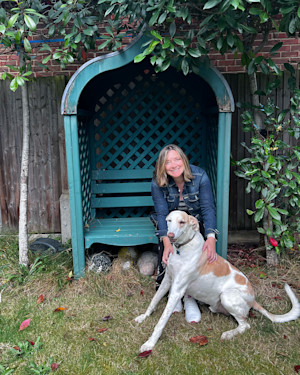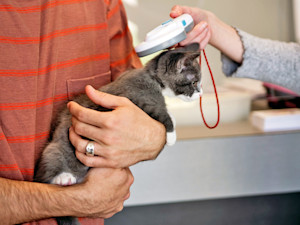Return of the Dog Tax? Here’s What a UK Pet Licence Might Look Like
And why different organisations disagree on the idea

Share Article
A recent YouGov study found that 85 percent of Britons think that in order to have a dog in your home, some form of dog licenceopens in new tab should exist. A third of those polled (32 percent) think that owning a cat should also require one. But with overflowing shelters and daily stories of the mistreatment of both cats and dogs at the hands of the people who are supposed to care for them, is the general public misguided in thinking a pet licence would fix things?
First, a history lesson (sit up straight at the back there): The Dog Licences Act of 1959opens in new tab made the annual licensing of dogs compulsory in Great Britain. However, the scheme was abolished in 1987. At that time, the licence cost just 37p(!) but was only held by around half of dog parents, a massive non-compliance headache, with a corresponding funding shortfall.
The problems the licence was designed to address, however, such as irresponsible dog parenting, straying, fouling in public places and dog attacks, continued to be an issue, so instead, dog control measures were written into laws such as the Environmental Protection Act 1990opens in new tab and the Dangerous Dogs Act 1991opens in new tab. This meant that money would be saved not only on the admin side of things, but also on enforcing it.
Since then, more laws have come into force, including compulsory microchipping for cats and dogs, and Lucy’s Law, which prevents puppies and kittens under six months from being sold by anyone other than their breeder. But are our newer laws working to meet welfare and societal needs? And is it time to reintroduce the dog licensing scheme and even extend it to cover other pets, such as cats?
Do pet licences work?
One organisation keen to see the introduction of a licensing scheme is the RSPCAopens in new tab, which is actively looking at how a licensing scheme could work for dogs in both England and Wales. Dr Samantha Gaines, RSPCA dog welfare expert and dog control lead, said licensing schemes have the potential to help trace dogs across the UK, giving us super useful info like how many dogs there are, where they are and who looks after them.
“While microchipping is already mandatory for dogs across the UK, a more comprehensive system would provide more robust data and monitoring,” she explains. “Better traceability also has the potential to help effective monitoring of dangerous dogs and to target enforcement, but to achieve this, we will also need accurate and detailed data on dog bites.“
She continues: “A licensing scheme could also raise income to fund enforcement and cover costs associated with dog control and problems for irresponsible dog ownership within communities. This means that dog owners contribute to costs derived from dogs, funds which are currently lacking from national and local governments.”
But not everyone agrees that a licence will work.
“Our experience at the Kennel Clubopens in new tab (KC) when looking at licensing schemes, including those in Northern Ireland and the Republic of Ireland, is that they cost more money to run than they bring in,” says Dr Ed Hayes, head of public affairs. “And in the end, it’s taxpayers that are subsidising the administrative costs.”
More importantly, says Dr Hayes, just because someone is granted a licence, it doesn‘t mean they‘re going to be responsible pet parents. “Collar and tag legislation and microchipping are far more beneficial tools to promote responsible ownership and reunite lost dogs.”
Dr Hayes references a scheme in Switzerland that mandated training courses for dog parentsopens in new tab but failed to reduce dog bite incidents and was abandoned after eight years.
Who would pay for a pet licensing scheme?
Solicitor and Golden Retriever pet parent Kate Floundersopens in new tab agrees: “In reality, I don’t know how much bite a licence scheme would have; why would you introduce a piece of legislation that previously didn’t work?” she says.
“Every local authority in this country is already struggling to meet its statutory obligations, so while a dog licence feels like a nice thing to exist, if this were added to their workload, we would be in danger of introducing something that’s not fit for purpose. I would prefer to see enforcement around the existing legislation, like the registration of dogs and cats we have through microchipping, and existing loopholes there tightened up.”
But the RSPCA disagrees: ”RSPCA research has shown that licensing outside of the UK has been successful.” A bylaw in Calgary, Canada, for instance, requires all cats and dogs to be licensed and generates revenue to support monitoring, delivering services, education and enforcement. ”The compliance rate is high, reaching levels of 90 percent, which means that it also provides invaluable data on the dog population and owner demographics, meaning solutions are more evidence-based, while helping enhance traceability of dangerous and at-risk dogs,” says Dr Gaines.
”We are calling on governments across the UK to commit to making changes that achieve better and more effective dog control – including the introduction of a system, like dog licensing, which achieves robust traceability and fund enforcement,” says Dr Gaines.
Another issue with a licence introduced today is the cost-of-living crisis, which, for pet parents runs alongside increased vet and other petcare costs. ”I worry that some parts of society would be shut out of pet ownership, with pet parenthood becoming an unattainable luxury, despite the mental health and well-being advantages it offers,” says Sophie Goffin, cat advocate and owner of cat sitting service Purry Godmotheropens in new tab.
”And I worry that with increased costs, people would be more likely to abandon their pets than before”, says Goffin.
”Instead, we should look at the culture and systems that surround legislation. Lots of cases around welfare and neglect can boil down to the animal’s caregiver struggling and lacking support in their home and community. All these systems need a thorough looking over” says Goffin.
She would also like to see ”more opportunities in schools to learn about and practice good animal behaviour and husbandry”, as well as a responsibility for “employers to recognise the important role pets play in family life”.
What’s the alternative to a pet licence?
If we can’t afford to administer and effectively enforce a new licensing scheme, and a proportion of pet parents can’t afford a licensing fee, what can we do?
Vet Dr Emma Pemberthyopens in new tab would like to see education prioritised above any move back to a licence. ‘It would be great if every owner understood the Five Freedoms of Animal Welfareopens in new tab before they took on a pet, and I also think with the amount of UK households that now have a pet, that a knowledge of pet needs and behaviour should be taught in schools, and covered at a grassroots level across the whole community.”
“The laws are there and can act as a deterrent when enforced, but in terms of things like better dog socialisation, it comes down to a deeper understanding of what a dog needs; owners need more support.”
For Dr Pemberthy, the potential cost of a licence comes with many problems. ”I wouldn’t want the cost of a licence preventing people from having a pet, because it can be a lifeline in terms of companionship and care. We shouldn’t be creating barriers that stop people from welcoming a pet into their lives or discourage a pet owner from seeking vet care.”
She says: ”Rescues are already struggling with the rehoming population, a costly licence might prevent adoptions or place extra costs on the rescue itself.”
The Kennel Club would also like to see the public better educated on how to behave around dogs. “For years we have been asking for animal welfare to be included on the National Curriculum,” says Dr Hayes.
“There’s no one simple solution to the problem of dog welfare, and responsible dog breeding and ownership,” he says. “But we need more legislation, better legislation and legislation that’s better enforced.”
Education is a key element to any future legislation for behaviourist Zoe Willinghamopens in new tab, too. “On its own, any licence is pointless unless it is being policed and controlled,” she says. “And it needs some form of education around it. It would be far more useful to make it compulsory to do some sort of welfare training, so any scheme could benefit the animal and not just make money. A licence wouldn’t help with reducing rescue numbers, only responsible owners can stop pets being rehomed.”
Resources
Difford, D. (2025). Most Britons are in favour of dog licencesopens in new tab. [online] Yougov.co.uk.
Legislation.gov.uk. (2025). Dog Licences Act 1959opens in new tab. [online]
UK Government (2025). Environmental Protection Act 1990opens in new tab. [online] Legislation.gov.uk.
GOV.UK (1991). Dangerous Dogs Act 1991opens in new tab. [online] Legislation.gov.uk.
News from Elsewhere (2016). Switzerland scraps mandatory dog trainingopens in new tab. BBC News. [online] 20 Sep.
RSPCA (2006). The five welfare needsopens in new tab. [online]

Vanessa Holburn
Vanessa Holburn is a journalist whose work has featured in The Telegraph, The Express and The Mirror, as well as Wunderdog, Dogs Today, Bella and Fabulous magazines. She is also the author of How To Pick A Puppyopens in new tab and was part of the successful #LucysLaw campaignopens in new tab that banned puppies from being sold in pet shops. She’s a dog mum to Ziggy, a sofa-loving rescued Lurcher and they are both owned by two tabby cats, Lollipop and Jelly Bean.
Related articles
![a man holds a kitten while a woman scans it for microchip]()
Cat Microchipping Law: What Happens if You Don’t Comply
Microchipping your cat is quick and painless – and it’s now required by law
![woman hugging dog]()
Where to Get Help If You’re Struggling to Afford Your Pet
If you’re struggling with pet care costs, you are far from alone and there’s no shame seeking help. Here’s a few places to start



